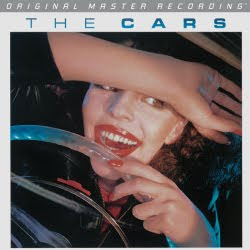The Cars
(Reissue)
The Cars
Elektra/Mobile Fidelity MFSL 1-274 180g LP
Produced by: Roy Thomas Baker
Engineered by: Geoff Workman
Mixed by: Roy Thomas Baker
Mastered by: Shawn R. Britton at Mobile Fidelity Sound Labs
MUSIC
SOUND
Mo-Fi Gives The Cars Just What It Needed!
by Michael Fremer
February 01, 2010
(Corrected version: Elliot Easton is still with us. Ben Orr, unfortunately, passed away in 2000. I mistakenly said "the late Elliot Easton" in the original review. My apologies!)
The Cars didn’t swing but that was the point. Rick Ocasek didn’t emote much, but that too was the point. The Cars were all about gleaming chrome, hard edges, not too glam-rock and taking Roxy Music to its logical, stripped down conclusion. The musical and cultural concept was modern yet retro. It was an American band, after all.
It was 1978 and The Cars helped usher in and would eventually be overtaken by the synth disco hair bands. Despite the trappings, The Cars were very conservative, from David Robinson’s tidy on-the-beat drumming to Greg Hawkes’ orderly synth lines. No raucous Eno squealing for him.
Even when allowed to predominate, on the final tune “All Mixed Up,” the synth parts are neat and punctual. Elliot Easton’s guitar lines were dazzlingly understated, serving to fill more than to puncture. Ric Ocasek’s vocals were cool and detached but hardly campy.
What made the debut click with the American public almost immediately were Ocasek’s songs: familiar enough and tuneful at their core but sufficiently alienated and alienating to effectively counterbalance the then dominant California culture.
Look at the pictures on the inner sleeve of the gatefold reissue and you see, despite the leopard skin tights, suspenders and the rest of the modestly hip get ups, more beantown working class earnestness than rock and roll outrageousness.
The album opens with “Good Times Roll,” a concept that usually produces musical and lyrical abandon but here, not so much. Over a stiff beat Ocasek makes it almost painful: “let them knock you around,” “let the stories be cold,” “let them make you a clown.” Sure, the idea is sort of roll with it but not comfortably or with abandon.
While “My Best Friend’s Girl” hints at a well-worn theme of longing and possessiveness, Ocasek flips it brilliantly at the end with “and she used to be mine.” The dismissive obsessiveness and cool cruelty of “Just What I Needed,” written by Ocasek but sung by bassist Benjamin Orr remains one of the great lyrical coups of modern rock. Combined with a brilliant opening, a tightly wound center and non-resolved ending, the tune’s demo version was much requested on WBCN-FM and helped signal the station’s paradigm shift from hippiedom to the “new wave” led by the program director Oedipus.
Over the decades, Ocasek’s spare, cool lyrics, filled with desire and ambivalence, only gleam brighter. There’s not a bad tune on this debut and the arrangements, though now familiar, are spare works that craftily whip rock guitar and new synth into candy gloss, carousel perfection. You could say some of it is too cute by half and accuse the beat of plodding now, but it did back then too. In fact, the deliberativeness of Robinson’s mechanical sounding rhythm tracks was and remains one of the album’s core strengths even as you will them to break free.
Recorded at AIR Studios in the UK and produced by Queen producer Roy Thomas Baker and originally mastered by George Marino at Sterling Sound, the album has always had a cool crunchiness that may have been intentional both to mirror the musical intent and to make it “pop” more on the radio but it never made for a great listen on a high performance audio system.
The original pressing has both a Sterling stamp on the lead out groove area and the initials “RTB” (scribed in the plastic), which probably means he was involved in the original cut. Clearly RTB wanted it cool and somewhat crunchy because the original Japanese pressing (Elektra Warner-Pioneer P-10552E) is more dynamic, more bass-intense and produces far more depth than does the original American issue.
Mo-Fi’s new gatefold edition sounds closer to the Japanese than to the original but it’s even better in most ways and as good in others. The Mo-fi is just crunchy enough, but not too crunchy and has excellent bottom end extension and definition. It also produces more depth and width than does the original and it doesn’t push the vocal harmonies up against a glass wall, which is something the others do.
If this is one of your ‘go to’ albums, go to your favorite records store, virtual or brick and mortar, and get this. It’s just what you’re needing.
Thanks to Michael over at www.musicangle.com for the exclusive rights to reprint this material. Stop by MusicAngle.com for more reviews and features.
©2010 MusicAngle.com & Michael Fremer - - All rights reserved
Reprinted by Permission


No comments:
Post a Comment